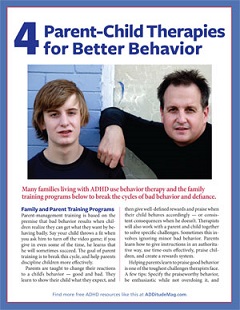Parents Raising ADHD Kids: Start with Behavior Therapy, Not Medication
A new report released by the CDC shows the gap between medication use and recommended behavioral therapy for young children with ADHD.
ADHD News Feed
|
posted by
Devon Frye
Next Blog » Two-Minute Warning May Actually Complicate Transitions
Previous Blog « ADHD More Common in Children with Vision Problems




